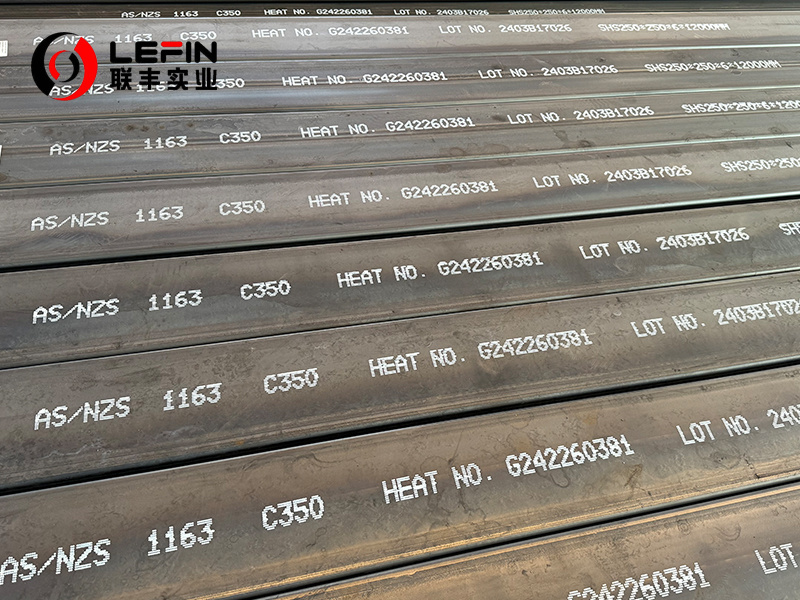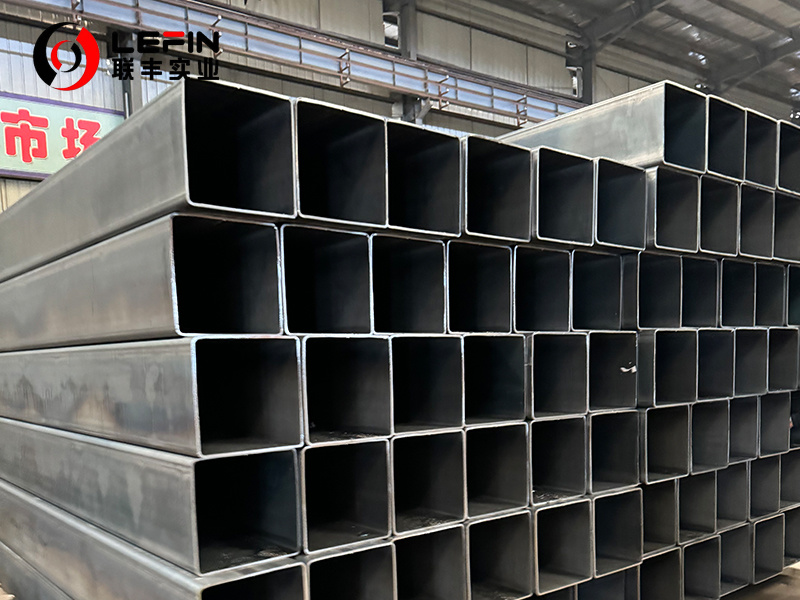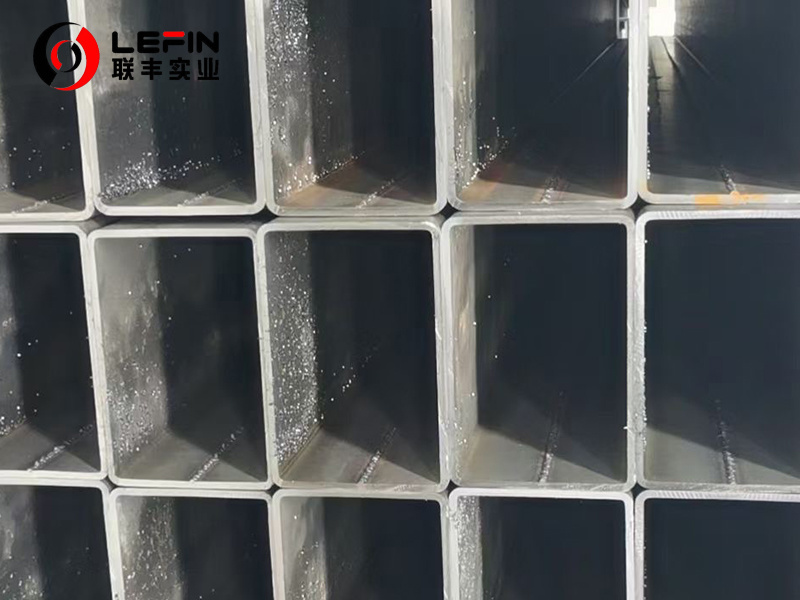



- Details
-
AS/NZS 1163 C350 is an Australian/New Zealand Standard for cold-formed structural steel hollow sections, commonly used in construction and engineering applications. Below is a detailed description of this standard and the C350 grade:
Standard Overview – AS/NZS 1163
Title: Cold-formed structural steel hollow sectionsScope: Specifies requirements for circular, rectangular, and square hollow sections (CHS, RHS, SHS) manufactured by cold-forming and welding.
Applications: Used in structural frameworks, buildings, bridges, machinery, and other load-bearing components.
Material: Carbon steel with specified mechanical properties.
C350 Grade Specifications
The "C350" designation refers to the minimum yield strength (350 MPa) of the steel.Key Properties:
● Yield Strength (min): 350 MPa (hence "C350")
● Tensile Strength: Typically 430 MPa (varies based on thickness and processing)
● Elongation: Minimum 16% ( CHS, d0/t≤15); Minimum 12% ( RHS, d/t≤15)
Chemical Composition:
● Carbon (C): ≤ 0.20%
● Silicon (Si):≤ 0.45%
● Manganese (Mn): ≤ 1.60%
● Phosphorus (P), Sulfur (S): Low (≤ 0.030% each)
● May include micro-alloying elements (e.g., Nb, V, Ti) for strength.
Manufacturing Process:● Cold-forming: Steel sheets are roll-formed and welded into hollow sections at ambient temperature.
● Welding: High-frequency electric resistance welding (HFW) is typically used.
● Surface Finish: Usually galvanized or painted for corrosion resistance (if specified).
Dimensional Tolerances (AS/NZS 1163):
● Outer dimensions (width, depth, diameter): ±1% or ±0.5 mm (whichever is greater).
● Wall thickness: Varies by section type (e.g., ±10% for SHS and RHS).
Common Applications
AS/NZS 1163 C350 is widely used in various construction and engineering applications due to its high strength and versatility. Common applications include:Structural Frames: For commercial buildings, warehouses, and bridge supports.
Mechanical Engineering: In the manufacturing of machinery and equipment.
Handrails, Furniture, and Display Stands: Due to its aesthetic appeal and structural integrity.
Comparison With Other Grades
C250: C350 offers higher strength (350 MPa vs. 250 MPa yield strength) and greater load-bearing capacity.C450: While C450 provides even higher strength (450 MPa yield strength), C350 offers better ductility and is often more cost-effective.
AS/NZS 3678 (Hot-rolled): Similar grades (e.g., 350W) but different forming process.
Conclusion
AS/NZS 1163 C350 is a high-strength cold-formed hollow section steel widely used in construction and engineering due to its balance of strength, weldability, and formability. It meets stringent Australian/New Zealand standards for structural integrity.

AS/NZS 1163 C350 Steel Pipes
Subcategory
Keyword
- Details
-
AS/NZS 1163 C350 is an Australian/New Zealand Standard for cold-formed structural steel hollow sections, commonly used in construction and engineering applications. Below is a detailed description of this standard and the C350 grade:
Standard Overview – AS/NZS 1163
Title: Cold-formed structural steel hollow sectionsScope: Specifies requirements for circular, rectangular, and square hollow sections (CHS, RHS, SHS) manufactured by cold-forming and welding.
Applications: Used in structural frameworks, buildings, bridges, machinery, and other load-bearing components.
Material: Carbon steel with specified mechanical properties.
C350 Grade Specifications
The "C350" designation refers to the minimum yield strength (350 MPa) of the steel.Key Properties:
● Yield Strength (min): 350 MPa (hence "C350")
● Tensile Strength: Typically 430 MPa (varies based on thickness and processing)
● Elongation: Minimum 16% ( CHS, d0/t≤15); Minimum 12% ( RHS, d/t≤15)
Chemical Composition:
● Carbon (C): ≤ 0.20%
● Silicon (Si):≤ 0.45%
● Manganese (Mn): ≤ 1.60%
● Phosphorus (P), Sulfur (S): Low (≤ 0.030% each)
● May include micro-alloying elements (e.g., Nb, V, Ti) for strength.
Manufacturing Process:● Cold-forming: Steel sheets are roll-formed and welded into hollow sections at ambient temperature.
● Welding: High-frequency electric resistance welding (HFW) is typically used.
● Surface Finish: Usually galvanized or painted for corrosion resistance (if specified).
Dimensional Tolerances (AS/NZS 1163):
● Outer dimensions (width, depth, diameter): ±1% or ±0.5 mm (whichever is greater).
● Wall thickness: Varies by section type (e.g., ±10% for SHS and RHS).
Common Applications
AS/NZS 1163 C350 is widely used in various construction and engineering applications due to its high strength and versatility. Common applications include:Structural Frames: For commercial buildings, warehouses, and bridge supports.
Mechanical Engineering: In the manufacturing of machinery and equipment.
Handrails, Furniture, and Display Stands: Due to its aesthetic appeal and structural integrity.
Comparison With Other Grades
C250: C350 offers higher strength (350 MPa vs. 250 MPa yield strength) and greater load-bearing capacity.C450: While C450 provides even higher strength (450 MPa yield strength), C350 offers better ductility and is often more cost-effective.
AS/NZS 3678 (Hot-rolled): Similar grades (e.g., 350W) but different forming process.
Conclusion
AS/NZS 1163 C350 is a high-strength cold-formed hollow section steel widely used in construction and engineering due to its balance of strength, weldability, and formability. It meets stringent Australian/New Zealand standards for structural integrity.

Related products
Product Consulting

Address: Hengtai Road,Daqiuzhuang Town,Jinghai County,Tianjin,China
Mob: +8615122229899(whatspp)
Phone: +86 22 58171905
Fax: +86 22 58171902
E-mail:info@lefinsteel.com
Get company updates

Tianjin Lefin Industrial Co.,Ltd. All rights reserved City sub-station SEO www.300.cn

